A Comprehensive Literature Review: Social Media and Mental Health
VerifiedAdded on 2022/08/20
|10
|2823
|13
Literature Review
AI Summary
This literature review examines the multifaceted relationship between social media and mental health, drawing upon several studies to explore both the positive and negative impacts. It discusses how social media can facilitate peer-to-peer support and provide access to online interventions for individuals with mental health issues, while also highlighting the risks of misinformation and negative social comparisons. The review analyzes the role of platforms like Twitter in providing informal spaces for sharing experiences and feedback, and investigates the correlation between social media usage and mental health outcomes among young adults, including symptoms of anxiety, depression, and suicidal ideation. Ultimately, the review emphasizes the importance of understanding the complexities of social media's influence on mental well-being and calls for further research to maximize its benefits while mitigating potential harms. Desklib offers a wealth of similar resources, including solved assignments and past papers, to support students in their academic pursuits.
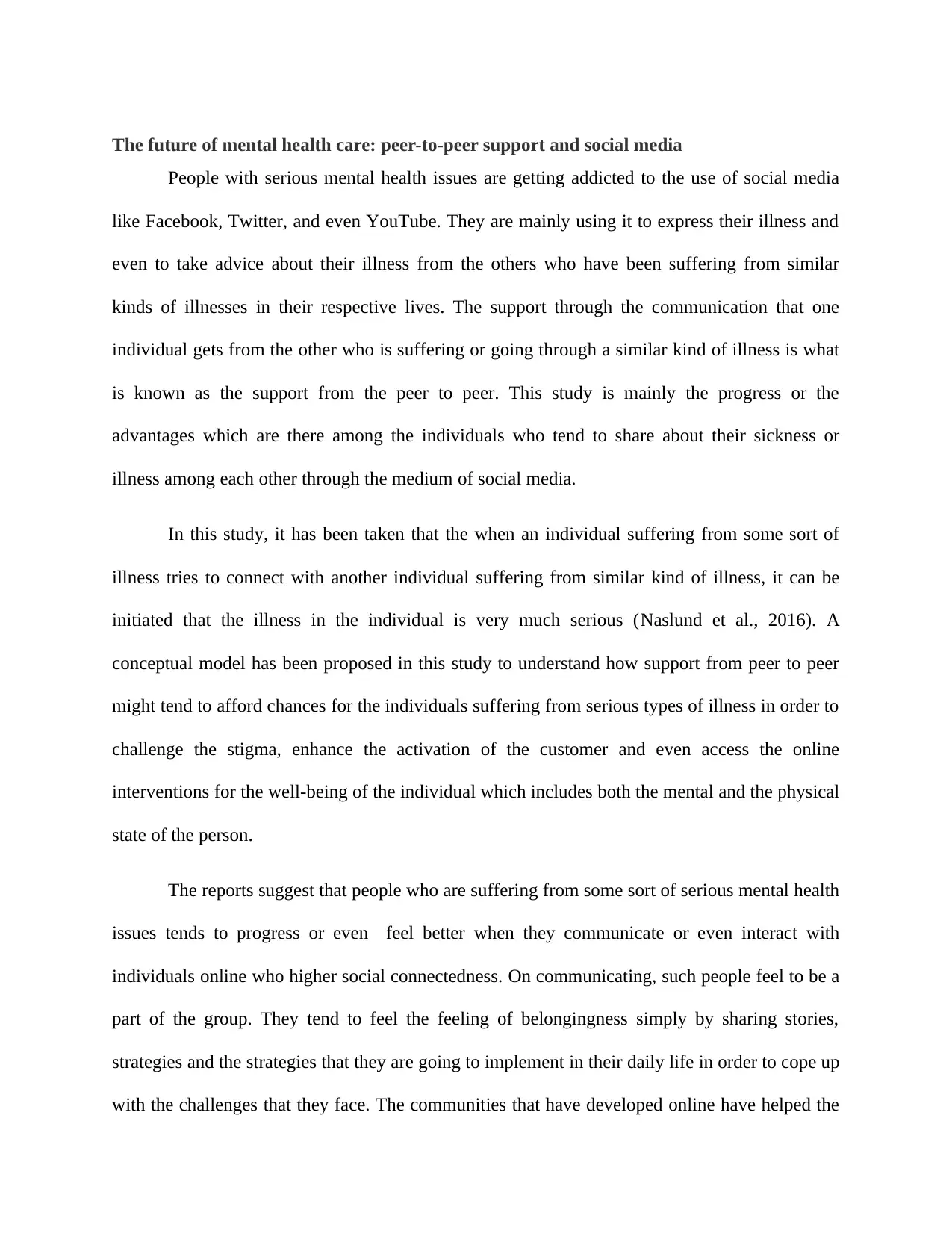
The future of mental health care: peer-to-peer support and social media
People with serious mental health issues are getting addicted to the use of social media
like Facebook, Twitter, and even YouTube. They are mainly using it to express their illness and
even to take advice about their illness from the others who have been suffering from similar
kinds of illnesses in their respective lives. The support through the communication that one
individual gets from the other who is suffering or going through a similar kind of illness is what
is known as the support from the peer to peer. This study is mainly the progress or the
advantages which are there among the individuals who tend to share about their sickness or
illness among each other through the medium of social media.
In this study, it has been taken that the when an individual suffering from some sort of
illness tries to connect with another individual suffering from similar kind of illness, it can be
initiated that the illness in the individual is very much serious (Naslund et al., 2016). A
conceptual model has been proposed in this study to understand how support from peer to peer
might tend to afford chances for the individuals suffering from serious types of illness in order to
challenge the stigma, enhance the activation of the customer and even access the online
interventions for the well-being of the individual which includes both the mental and the physical
state of the person.
The reports suggest that people who are suffering from some sort of serious mental health
issues tends to progress or even feel better when they communicate or even interact with
individuals online who higher social connectedness. On communicating, such people feel to be a
part of the group. They tend to feel the feeling of belongingness simply by sharing stories,
strategies and the strategies that they are going to implement in their daily life in order to cope up
with the challenges that they face. The communities that have developed online have helped the
People with serious mental health issues are getting addicted to the use of social media
like Facebook, Twitter, and even YouTube. They are mainly using it to express their illness and
even to take advice about their illness from the others who have been suffering from similar
kinds of illnesses in their respective lives. The support through the communication that one
individual gets from the other who is suffering or going through a similar kind of illness is what
is known as the support from the peer to peer. This study is mainly the progress or the
advantages which are there among the individuals who tend to share about their sickness or
illness among each other through the medium of social media.
In this study, it has been taken that the when an individual suffering from some sort of
illness tries to connect with another individual suffering from similar kind of illness, it can be
initiated that the illness in the individual is very much serious (Naslund et al., 2016). A
conceptual model has been proposed in this study to understand how support from peer to peer
might tend to afford chances for the individuals suffering from serious types of illness in order to
challenge the stigma, enhance the activation of the customer and even access the online
interventions for the well-being of the individual which includes both the mental and the physical
state of the person.
The reports suggest that people who are suffering from some sort of serious mental health
issues tends to progress or even feel better when they communicate or even interact with
individuals online who higher social connectedness. On communicating, such people feel to be a
part of the group. They tend to feel the feeling of belongingness simply by sharing stories,
strategies and the strategies that they are going to implement in their daily life in order to cope up
with the challenges that they face. The communities that have developed online have helped the
Paraphrase This Document
Need a fresh take? Get an instant paraphrase of this document with our AI Paraphraser
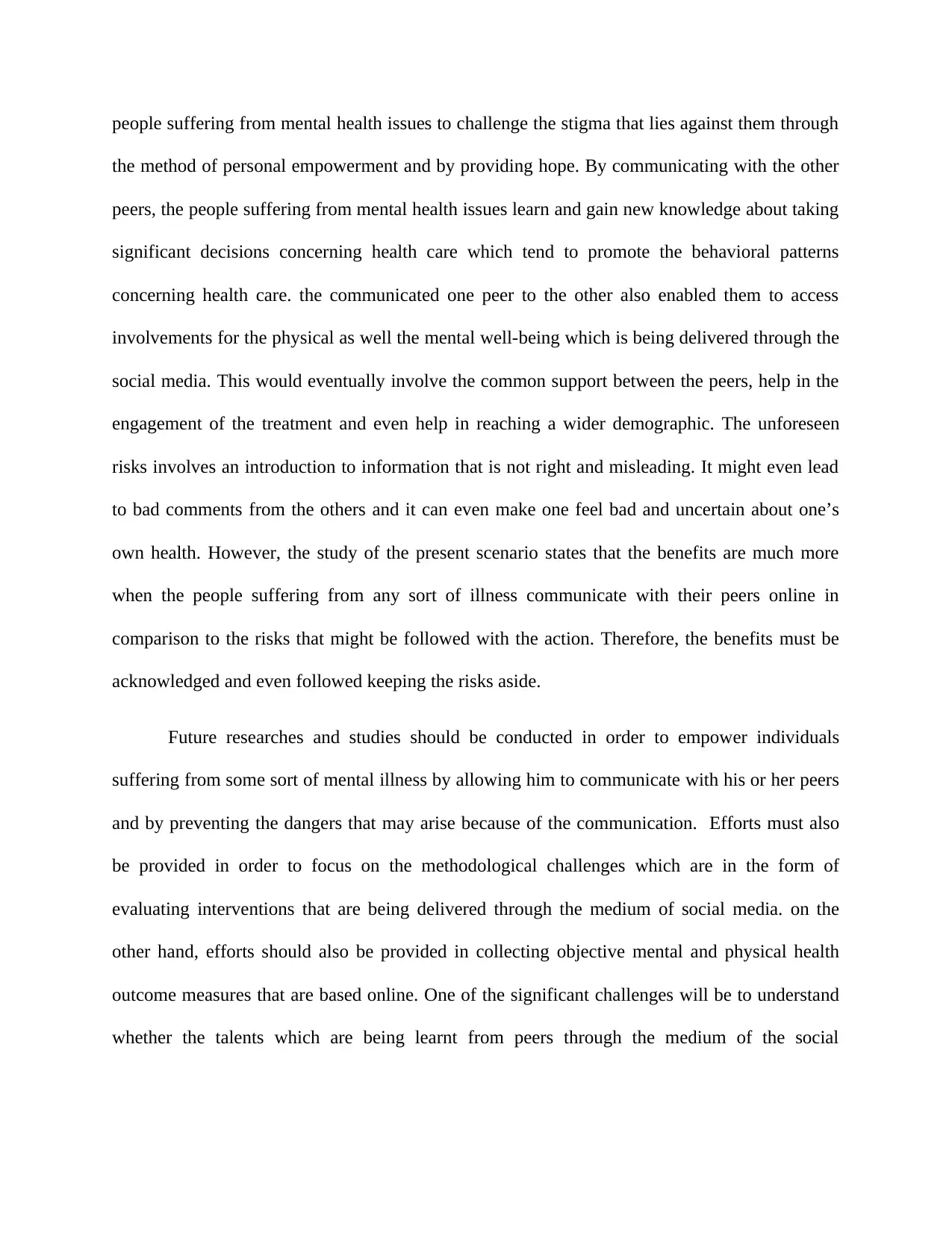
people suffering from mental health issues to challenge the stigma that lies against them through
the method of personal empowerment and by providing hope. By communicating with the other
peers, the people suffering from mental health issues learn and gain new knowledge about taking
significant decisions concerning health care which tend to promote the behavioral patterns
concerning health care. the communicated one peer to the other also enabled them to access
involvements for the physical as well the mental well-being which is being delivered through the
social media. This would eventually involve the common support between the peers, help in the
engagement of the treatment and even help in reaching a wider demographic. The unforeseen
risks involves an introduction to information that is not right and misleading. It might even lead
to bad comments from the others and it can even make one feel bad and uncertain about one’s
own health. However, the study of the present scenario states that the benefits are much more
when the people suffering from any sort of illness communicate with their peers online in
comparison to the risks that might be followed with the action. Therefore, the benefits must be
acknowledged and even followed keeping the risks aside.
Future researches and studies should be conducted in order to empower individuals
suffering from some sort of mental illness by allowing him to communicate with his or her peers
and by preventing the dangers that may arise because of the communication. Efforts must also
be provided in order to focus on the methodological challenges which are in the form of
evaluating interventions that are being delivered through the medium of social media. on the
other hand, efforts should also be provided in collecting objective mental and physical health
outcome measures that are based online. One of the significant challenges will be to understand
whether the talents which are being learnt from peers through the medium of the social
the method of personal empowerment and by providing hope. By communicating with the other
peers, the people suffering from mental health issues learn and gain new knowledge about taking
significant decisions concerning health care which tend to promote the behavioral patterns
concerning health care. the communicated one peer to the other also enabled them to access
involvements for the physical as well the mental well-being which is being delivered through the
social media. This would eventually involve the common support between the peers, help in the
engagement of the treatment and even help in reaching a wider demographic. The unforeseen
risks involves an introduction to information that is not right and misleading. It might even lead
to bad comments from the others and it can even make one feel bad and uncertain about one’s
own health. However, the study of the present scenario states that the benefits are much more
when the people suffering from any sort of illness communicate with their peers online in
comparison to the risks that might be followed with the action. Therefore, the benefits must be
acknowledged and even followed keeping the risks aside.
Future researches and studies should be conducted in order to empower individuals
suffering from some sort of mental illness by allowing him to communicate with his or her peers
and by preventing the dangers that may arise because of the communication. Efforts must also
be provided in order to focus on the methodological challenges which are in the form of
evaluating interventions that are being delivered through the medium of social media. on the
other hand, efforts should also be provided in collecting objective mental and physical health
outcome measures that are based online. One of the significant challenges will be to understand
whether the talents which are being learnt from peers through the medium of the social
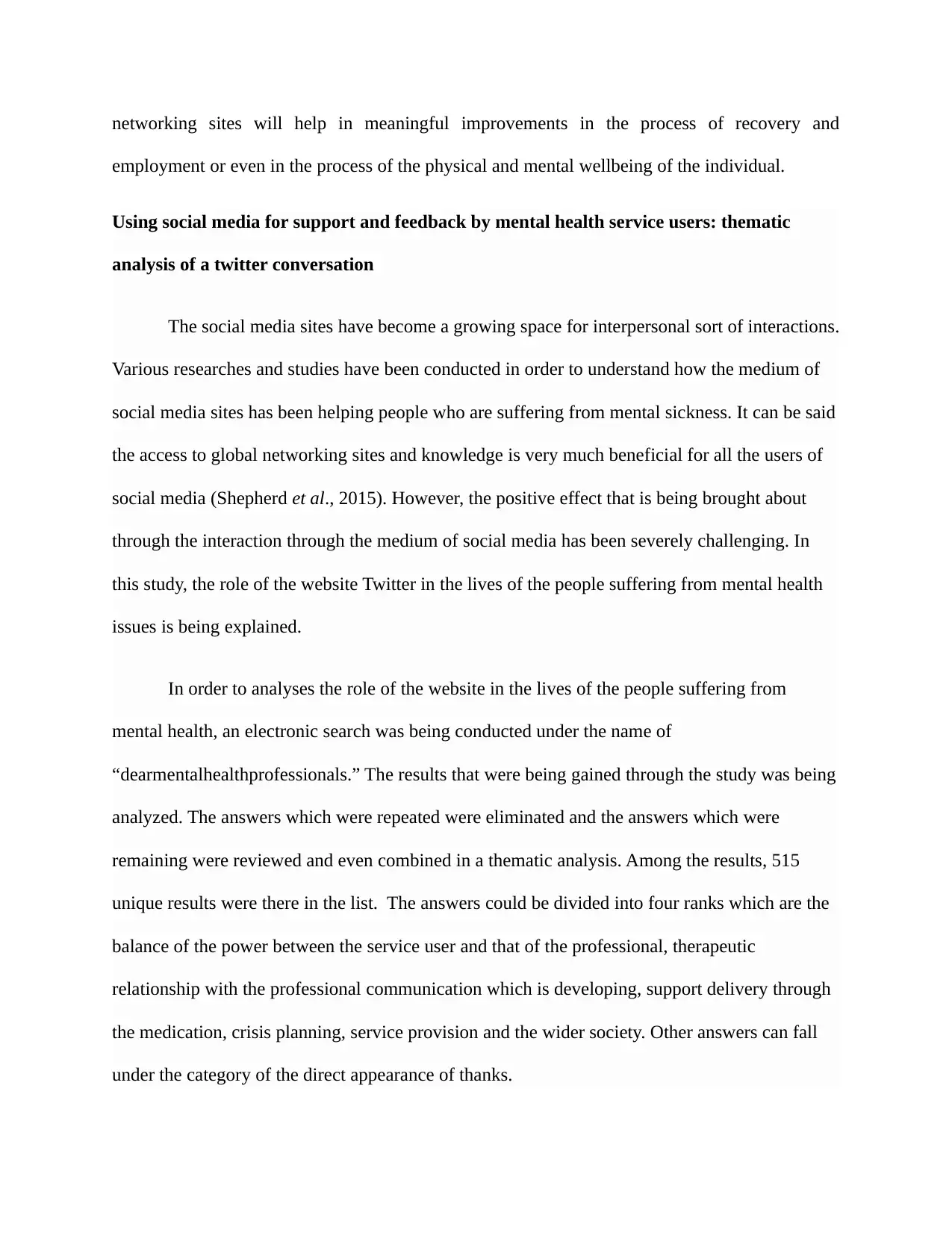
networking sites will help in meaningful improvements in the process of recovery and
employment or even in the process of the physical and mental wellbeing of the individual.
Using social media for support and feedback by mental health service users: thematic
analysis of a twitter conversation
The social media sites have become a growing space for interpersonal sort of interactions.
Various researches and studies have been conducted in order to understand how the medium of
social media sites has been helping people who are suffering from mental sickness. It can be said
the access to global networking sites and knowledge is very much beneficial for all the users of
social media (Shepherd et al., 2015). However, the positive effect that is being brought about
through the interaction through the medium of social media has been severely challenging. In
this study, the role of the website Twitter in the lives of the people suffering from mental health
issues is being explained.
In order to analyses the role of the website in the lives of the people suffering from
mental health, an electronic search was being conducted under the name of
“dearmentalhealthprofessionals.” The results that were being gained through the study was being
analyzed. The answers which were repeated were eliminated and the answers which were
remaining were reviewed and even combined in a thematic analysis. Among the results, 515
unique results were there in the list. The answers could be divided into four ranks which are the
balance of the power between the service user and that of the professional, therapeutic
relationship with the professional communication which is developing, support delivery through
the medication, crisis planning, service provision and the wider society. Other answers can fall
under the category of the direct appearance of thanks.
employment or even in the process of the physical and mental wellbeing of the individual.
Using social media for support and feedback by mental health service users: thematic
analysis of a twitter conversation
The social media sites have become a growing space for interpersonal sort of interactions.
Various researches and studies have been conducted in order to understand how the medium of
social media sites has been helping people who are suffering from mental sickness. It can be said
the access to global networking sites and knowledge is very much beneficial for all the users of
social media (Shepherd et al., 2015). However, the positive effect that is being brought about
through the interaction through the medium of social media has been severely challenging. In
this study, the role of the website Twitter in the lives of the people suffering from mental health
issues is being explained.
In order to analyses the role of the website in the lives of the people suffering from
mental health, an electronic search was being conducted under the name of
“dearmentalhealthprofessionals.” The results that were being gained through the study was being
analyzed. The answers which were repeated were eliminated and the answers which were
remaining were reviewed and even combined in a thematic analysis. Among the results, 515
unique results were there in the list. The answers could be divided into four ranks which are the
balance of the power between the service user and that of the professional, therapeutic
relationship with the professional communication which is developing, support delivery through
the medication, crisis planning, service provision and the wider society. Other answers can fall
under the category of the direct appearance of thanks.
⊘ This is a preview!⊘
Do you want full access?
Subscribe today to unlock all pages.

Trusted by 1+ million students worldwide
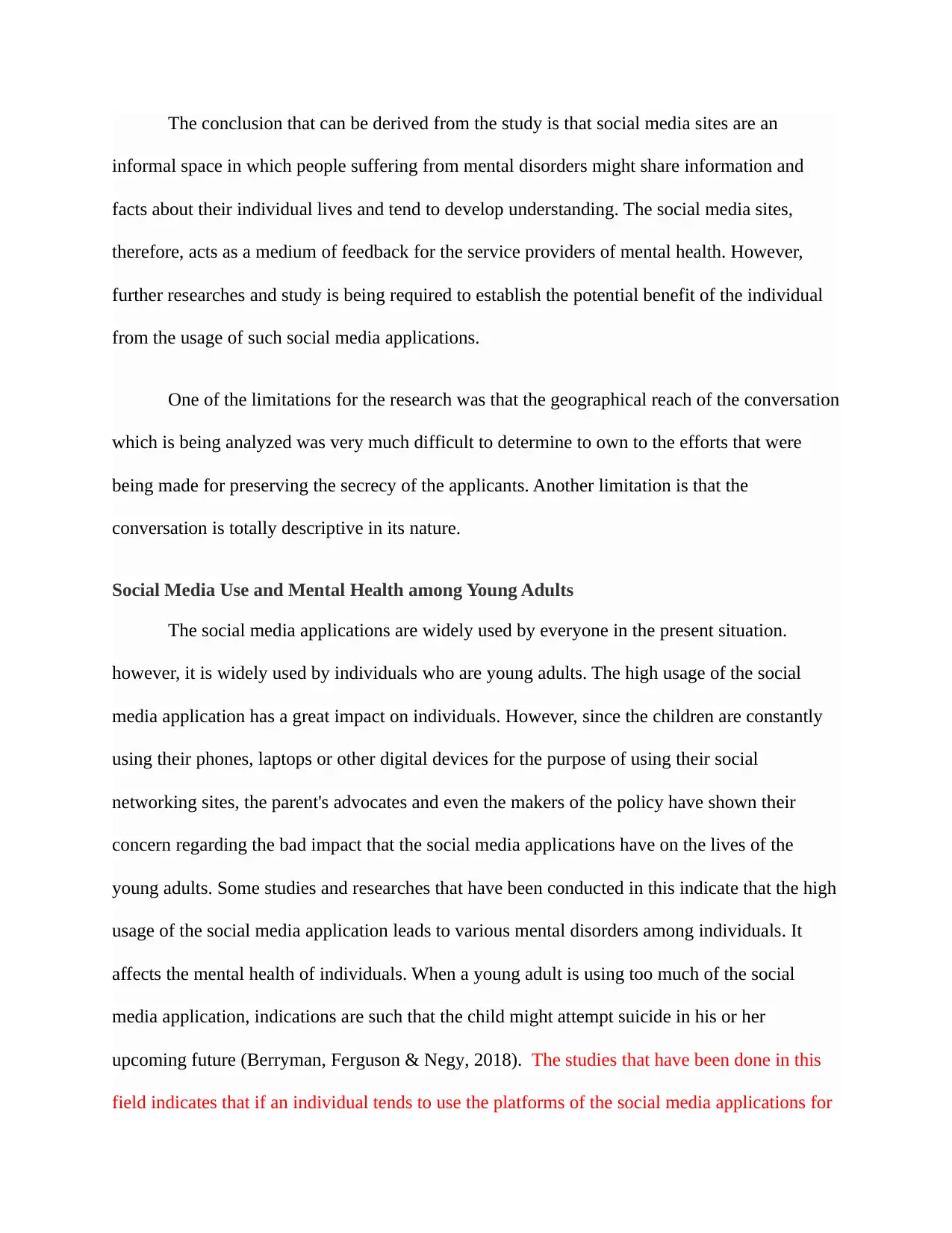
The conclusion that can be derived from the study is that social media sites are an
informal space in which people suffering from mental disorders might share information and
facts about their individual lives and tend to develop understanding. The social media sites,
therefore, acts as a medium of feedback for the service providers of mental health. However,
further researches and study is being required to establish the potential benefit of the individual
from the usage of such social media applications.
One of the limitations for the research was that the geographical reach of the conversation
which is being analyzed was very much difficult to determine to own to the efforts that were
being made for preserving the secrecy of the applicants. Another limitation is that the
conversation is totally descriptive in its nature.
Social Media Use and Mental Health among Young Adults
The social media applications are widely used by everyone in the present situation.
however, it is widely used by individuals who are young adults. The high usage of the social
media application has a great impact on individuals. However, since the children are constantly
using their phones, laptops or other digital devices for the purpose of using their social
networking sites, the parent's advocates and even the makers of the policy have shown their
concern regarding the bad impact that the social media applications have on the lives of the
young adults. Some studies and researches that have been conducted in this indicate that the high
usage of the social media application leads to various mental disorders among individuals. It
affects the mental health of individuals. When a young adult is using too much of the social
media application, indications are such that the child might attempt suicide in his or her
upcoming future (Berryman, Ferguson & Negy, 2018). The studies that have been done in this
field indicates that if an individual tends to use the platforms of the social media applications for
informal space in which people suffering from mental disorders might share information and
facts about their individual lives and tend to develop understanding. The social media sites,
therefore, acts as a medium of feedback for the service providers of mental health. However,
further researches and study is being required to establish the potential benefit of the individual
from the usage of such social media applications.
One of the limitations for the research was that the geographical reach of the conversation
which is being analyzed was very much difficult to determine to own to the efforts that were
being made for preserving the secrecy of the applicants. Another limitation is that the
conversation is totally descriptive in its nature.
Social Media Use and Mental Health among Young Adults
The social media applications are widely used by everyone in the present situation.
however, it is widely used by individuals who are young adults. The high usage of the social
media application has a great impact on individuals. However, since the children are constantly
using their phones, laptops or other digital devices for the purpose of using their social
networking sites, the parent's advocates and even the makers of the policy have shown their
concern regarding the bad impact that the social media applications have on the lives of the
young adults. Some studies and researches that have been conducted in this indicate that the high
usage of the social media application leads to various mental disorders among individuals. It
affects the mental health of individuals. When a young adult is using too much of the social
media application, indications are such that the child might attempt suicide in his or her
upcoming future (Berryman, Ferguson & Negy, 2018). The studies that have been done in this
field indicates that if an individual tends to use the platforms of the social media applications for
Paraphrase This Document
Need a fresh take? Get an instant paraphrase of this document with our AI Paraphraser
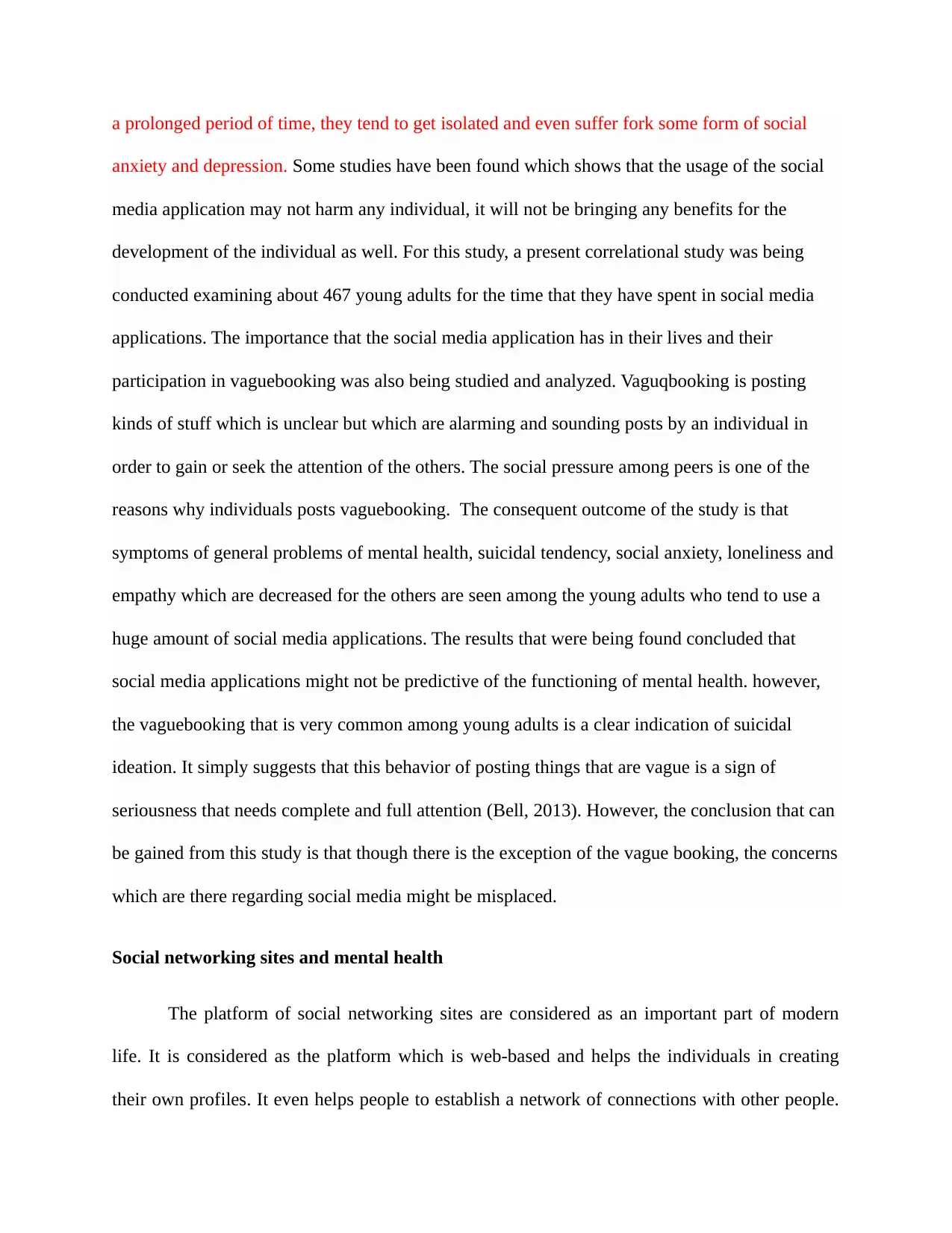
a prolonged period of time, they tend to get isolated and even suffer fork some form of social
anxiety and depression. Some studies have been found which shows that the usage of the social
media application may not harm any individual, it will not be bringing any benefits for the
development of the individual as well. For this study, a present correlational study was being
conducted examining about 467 young adults for the time that they have spent in social media
applications. The importance that the social media application has in their lives and their
participation in vaguebooking was also being studied and analyzed. Vaguqbooking is posting
kinds of stuff which is unclear but which are alarming and sounding posts by an individual in
order to gain or seek the attention of the others. The social pressure among peers is one of the
reasons why individuals posts vaguebooking. The consequent outcome of the study is that
symptoms of general problems of mental health, suicidal tendency, social anxiety, loneliness and
empathy which are decreased for the others are seen among the young adults who tend to use a
huge amount of social media applications. The results that were being found concluded that
social media applications might not be predictive of the functioning of mental health. however,
the vaguebooking that is very common among young adults is a clear indication of suicidal
ideation. It simply suggests that this behavior of posting things that are vague is a sign of
seriousness that needs complete and full attention (Bell, 2013). However, the conclusion that can
be gained from this study is that though there is the exception of the vague booking, the concerns
which are there regarding social media might be misplaced.
Social networking sites and mental health
The platform of social networking sites are considered as an important part of modern
life. It is considered as the platform which is web-based and helps the individuals in creating
their own profiles. It even helps people to establish a network of connections with other people.
anxiety and depression. Some studies have been found which shows that the usage of the social
media application may not harm any individual, it will not be bringing any benefits for the
development of the individual as well. For this study, a present correlational study was being
conducted examining about 467 young adults for the time that they have spent in social media
applications. The importance that the social media application has in their lives and their
participation in vaguebooking was also being studied and analyzed. Vaguqbooking is posting
kinds of stuff which is unclear but which are alarming and sounding posts by an individual in
order to gain or seek the attention of the others. The social pressure among peers is one of the
reasons why individuals posts vaguebooking. The consequent outcome of the study is that
symptoms of general problems of mental health, suicidal tendency, social anxiety, loneliness and
empathy which are decreased for the others are seen among the young adults who tend to use a
huge amount of social media applications. The results that were being found concluded that
social media applications might not be predictive of the functioning of mental health. however,
the vaguebooking that is very common among young adults is a clear indication of suicidal
ideation. It simply suggests that this behavior of posting things that are vague is a sign of
seriousness that needs complete and full attention (Bell, 2013). However, the conclusion that can
be gained from this study is that though there is the exception of the vague booking, the concerns
which are there regarding social media might be misplaced.
Social networking sites and mental health
The platform of social networking sites are considered as an important part of modern
life. It is considered as the platform which is web-based and helps the individuals in creating
their own profiles. It even helps people to establish a network of connections with other people.
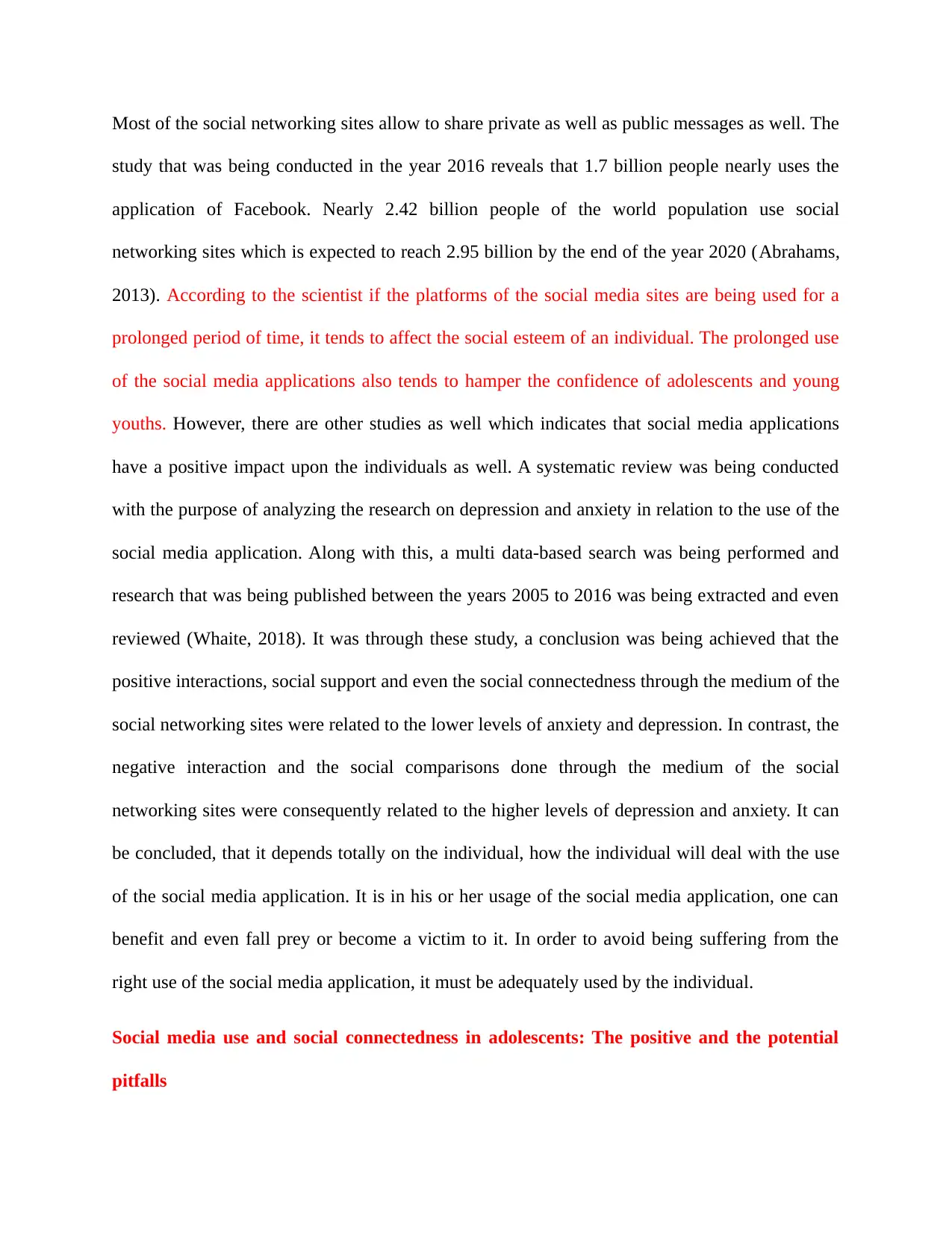
Most of the social networking sites allow to share private as well as public messages as well. The
study that was being conducted in the year 2016 reveals that 1.7 billion people nearly uses the
application of Facebook. Nearly 2.42 billion people of the world population use social
networking sites which is expected to reach 2.95 billion by the end of the year 2020 (Abrahams,
2013). According to the scientist if the platforms of the social media sites are being used for a
prolonged period of time, it tends to affect the social esteem of an individual. The prolonged use
of the social media applications also tends to hamper the confidence of adolescents and young
youths. However, there are other studies as well which indicates that social media applications
have a positive impact upon the individuals as well. A systematic review was being conducted
with the purpose of analyzing the research on depression and anxiety in relation to the use of the
social media application. Along with this, a multi data-based search was being performed and
research that was being published between the years 2005 to 2016 was being extracted and even
reviewed (Whaite, 2018). It was through these study, a conclusion was being achieved that the
positive interactions, social support and even the social connectedness through the medium of the
social networking sites were related to the lower levels of anxiety and depression. In contrast, the
negative interaction and the social comparisons done through the medium of the social
networking sites were consequently related to the higher levels of depression and anxiety. It can
be concluded, that it depends totally on the individual, how the individual will deal with the use
of the social media application. It is in his or her usage of the social media application, one can
benefit and even fall prey or become a victim to it. In order to avoid being suffering from the
right use of the social media application, it must be adequately used by the individual.
Social media use and social connectedness in adolescents: The positive and the potential
pitfalls
study that was being conducted in the year 2016 reveals that 1.7 billion people nearly uses the
application of Facebook. Nearly 2.42 billion people of the world population use social
networking sites which is expected to reach 2.95 billion by the end of the year 2020 (Abrahams,
2013). According to the scientist if the platforms of the social media sites are being used for a
prolonged period of time, it tends to affect the social esteem of an individual. The prolonged use
of the social media applications also tends to hamper the confidence of adolescents and young
youths. However, there are other studies as well which indicates that social media applications
have a positive impact upon the individuals as well. A systematic review was being conducted
with the purpose of analyzing the research on depression and anxiety in relation to the use of the
social media application. Along with this, a multi data-based search was being performed and
research that was being published between the years 2005 to 2016 was being extracted and even
reviewed (Whaite, 2018). It was through these study, a conclusion was being achieved that the
positive interactions, social support and even the social connectedness through the medium of the
social networking sites were related to the lower levels of anxiety and depression. In contrast, the
negative interaction and the social comparisons done through the medium of the social
networking sites were consequently related to the higher levels of depression and anxiety. It can
be concluded, that it depends totally on the individual, how the individual will deal with the use
of the social media application. It is in his or her usage of the social media application, one can
benefit and even fall prey or become a victim to it. In order to avoid being suffering from the
right use of the social media application, it must be adequately used by the individual.
Social media use and social connectedness in adolescents: The positive and the potential
pitfalls
⊘ This is a preview!⊘
Do you want full access?
Subscribe today to unlock all pages.

Trusted by 1+ million students worldwide
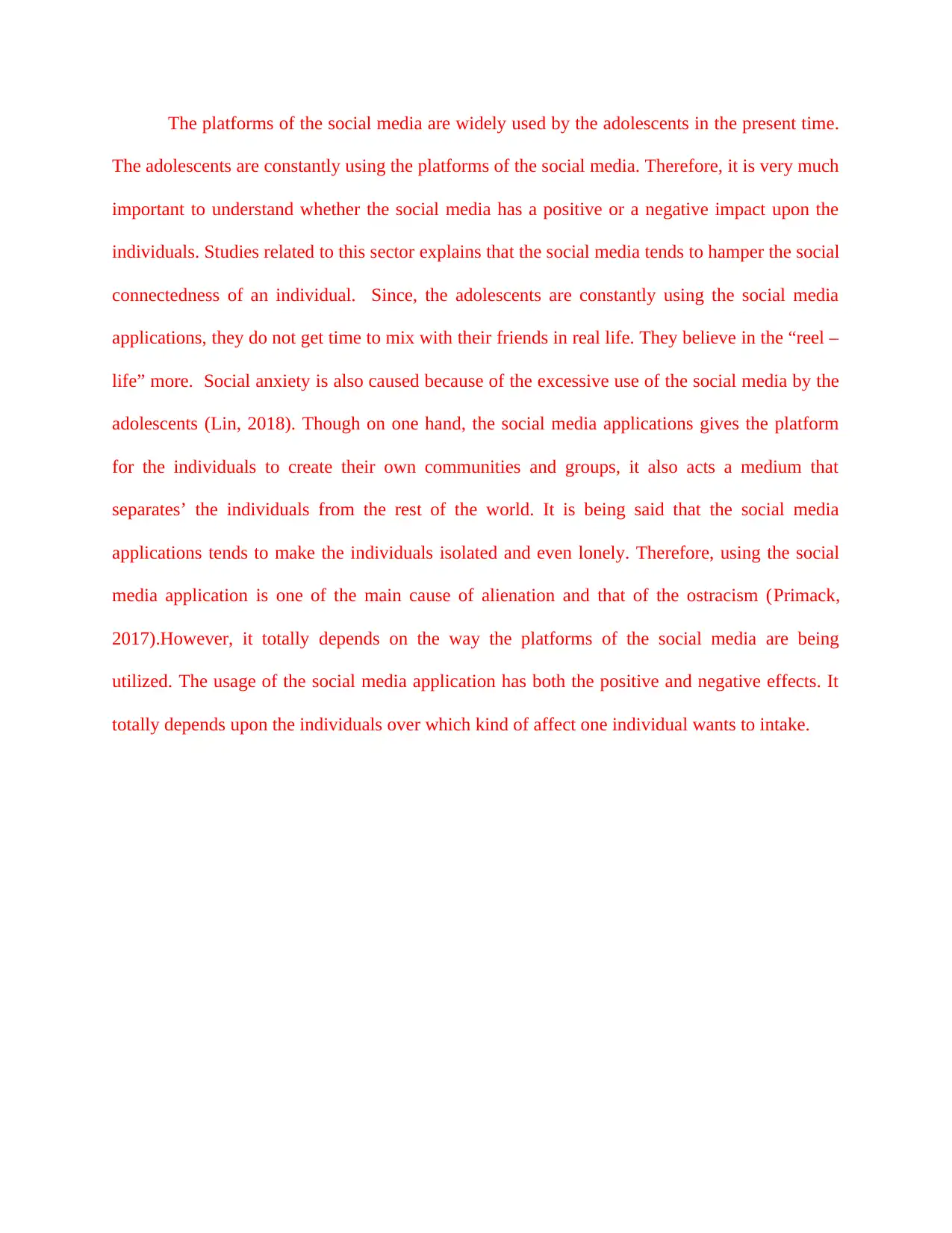
The platforms of the social media are widely used by the adolescents in the present time.
The adolescents are constantly using the platforms of the social media. Therefore, it is very much
important to understand whether the social media has a positive or a negative impact upon the
individuals. Studies related to this sector explains that the social media tends to hamper the social
connectedness of an individual. Since, the adolescents are constantly using the social media
applications, they do not get time to mix with their friends in real life. They believe in the “reel –
life” more. Social anxiety is also caused because of the excessive use of the social media by the
adolescents (Lin, 2018). Though on one hand, the social media applications gives the platform
for the individuals to create their own communities and groups, it also acts a medium that
separates’ the individuals from the rest of the world. It is being said that the social media
applications tends to make the individuals isolated and even lonely. Therefore, using the social
media application is one of the main cause of alienation and that of the ostracism (Primack,
2017).However, it totally depends on the way the platforms of the social media are being
utilized. The usage of the social media application has both the positive and negative effects. It
totally depends upon the individuals over which kind of affect one individual wants to intake.
The adolescents are constantly using the platforms of the social media. Therefore, it is very much
important to understand whether the social media has a positive or a negative impact upon the
individuals. Studies related to this sector explains that the social media tends to hamper the social
connectedness of an individual. Since, the adolescents are constantly using the social media
applications, they do not get time to mix with their friends in real life. They believe in the “reel –
life” more. Social anxiety is also caused because of the excessive use of the social media by the
adolescents (Lin, 2018). Though on one hand, the social media applications gives the platform
for the individuals to create their own communities and groups, it also acts a medium that
separates’ the individuals from the rest of the world. It is being said that the social media
applications tends to make the individuals isolated and even lonely. Therefore, using the social
media application is one of the main cause of alienation and that of the ostracism (Primack,
2017).However, it totally depends on the way the platforms of the social media are being
utilized. The usage of the social media application has both the positive and negative effects. It
totally depends upon the individuals over which kind of affect one individual wants to intake.
Paraphrase This Document
Need a fresh take? Get an instant paraphrase of this document with our AI Paraphraser
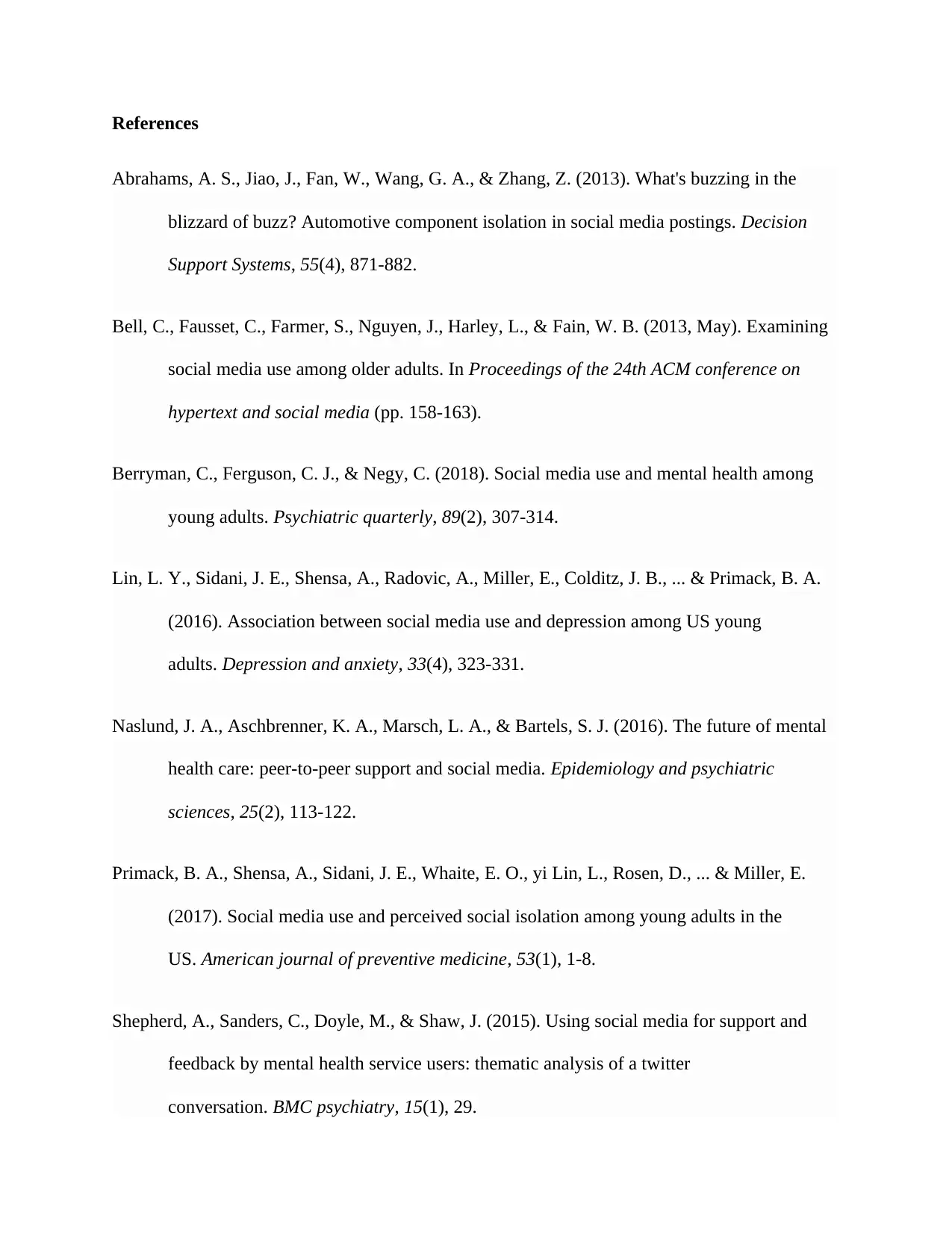
References
Abrahams, A. S., Jiao, J., Fan, W., Wang, G. A., & Zhang, Z. (2013). What's buzzing in the
blizzard of buzz? Automotive component isolation in social media postings. Decision
Support Systems, 55(4), 871-882.
Bell, C., Fausset, C., Farmer, S., Nguyen, J., Harley, L., & Fain, W. B. (2013, May). Examining
social media use among older adults. In Proceedings of the 24th ACM conference on
hypertext and social media (pp. 158-163).
Berryman, C., Ferguson, C. J., & Negy, C. (2018). Social media use and mental health among
young adults. Psychiatric quarterly, 89(2), 307-314.
Lin, L. Y., Sidani, J. E., Shensa, A., Radovic, A., Miller, E., Colditz, J. B., ... & Primack, B. A.
(2016). Association between social media use and depression among US young
adults. Depression and anxiety, 33(4), 323-331.
Naslund, J. A., Aschbrenner, K. A., Marsch, L. A., & Bartels, S. J. (2016). The future of mental
health care: peer-to-peer support and social media. Epidemiology and psychiatric
sciences, 25(2), 113-122.
Primack, B. A., Shensa, A., Sidani, J. E., Whaite, E. O., yi Lin, L., Rosen, D., ... & Miller, E.
(2017). Social media use and perceived social isolation among young adults in the
US. American journal of preventive medicine, 53(1), 1-8.
Shepherd, A., Sanders, C., Doyle, M., & Shaw, J. (2015). Using social media for support and
feedback by mental health service users: thematic analysis of a twitter
conversation. BMC psychiatry, 15(1), 29.
Abrahams, A. S., Jiao, J., Fan, W., Wang, G. A., & Zhang, Z. (2013). What's buzzing in the
blizzard of buzz? Automotive component isolation in social media postings. Decision
Support Systems, 55(4), 871-882.
Bell, C., Fausset, C., Farmer, S., Nguyen, J., Harley, L., & Fain, W. B. (2013, May). Examining
social media use among older adults. In Proceedings of the 24th ACM conference on
hypertext and social media (pp. 158-163).
Berryman, C., Ferguson, C. J., & Negy, C. (2018). Social media use and mental health among
young adults. Psychiatric quarterly, 89(2), 307-314.
Lin, L. Y., Sidani, J. E., Shensa, A., Radovic, A., Miller, E., Colditz, J. B., ... & Primack, B. A.
(2016). Association between social media use and depression among US young
adults. Depression and anxiety, 33(4), 323-331.
Naslund, J. A., Aschbrenner, K. A., Marsch, L. A., & Bartels, S. J. (2016). The future of mental
health care: peer-to-peer support and social media. Epidemiology and psychiatric
sciences, 25(2), 113-122.
Primack, B. A., Shensa, A., Sidani, J. E., Whaite, E. O., yi Lin, L., Rosen, D., ... & Miller, E.
(2017). Social media use and perceived social isolation among young adults in the
US. American journal of preventive medicine, 53(1), 1-8.
Shepherd, A., Sanders, C., Doyle, M., & Shaw, J. (2015). Using social media for support and
feedback by mental health service users: thematic analysis of a twitter
conversation. BMC psychiatry, 15(1), 29.
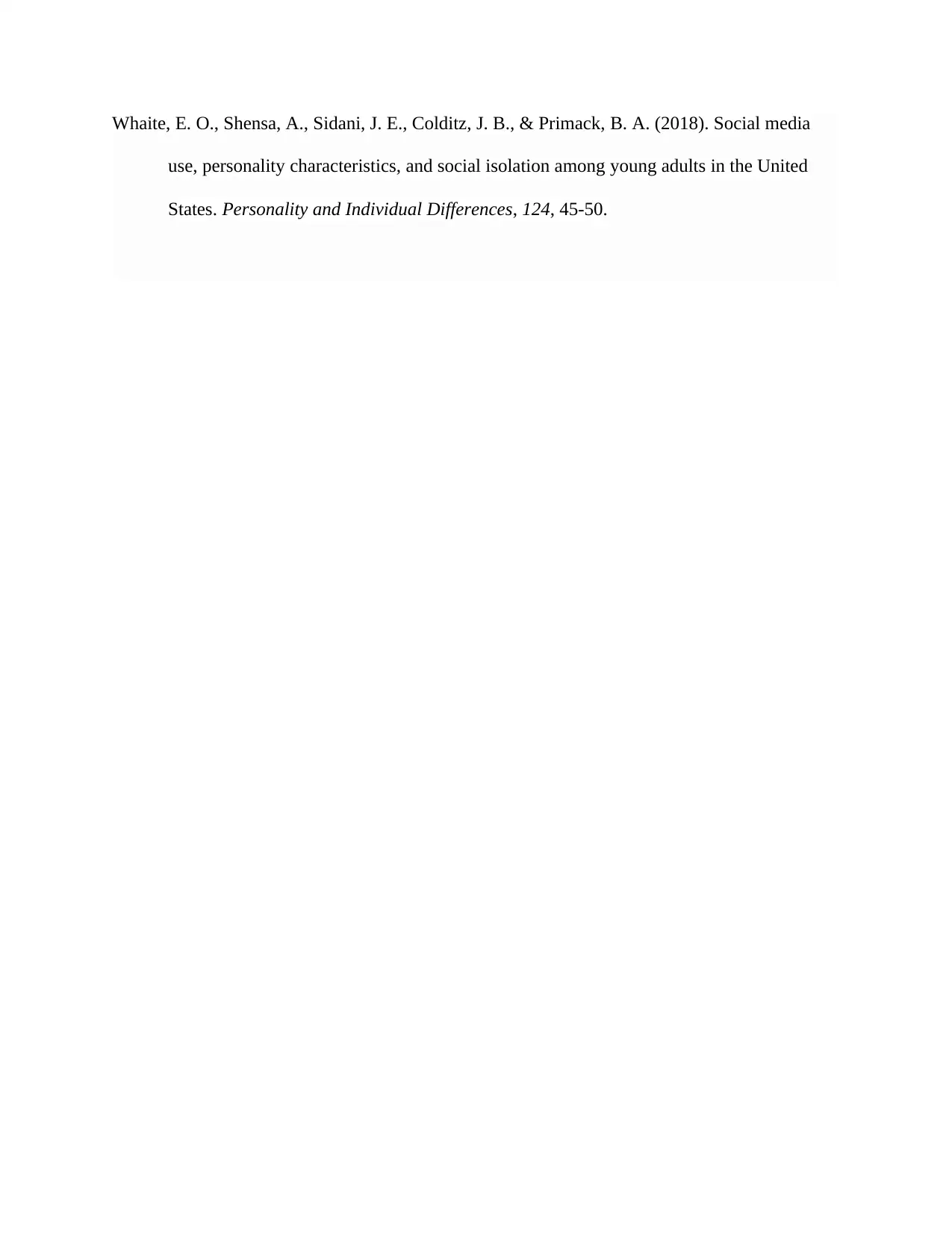
Whaite, E. O., Shensa, A., Sidani, J. E., Colditz, J. B., & Primack, B. A. (2018). Social media
use, personality characteristics, and social isolation among young adults in the United
States. Personality and Individual Differences, 124, 45-50.
use, personality characteristics, and social isolation among young adults in the United
States. Personality and Individual Differences, 124, 45-50.
⊘ This is a preview!⊘
Do you want full access?
Subscribe today to unlock all pages.

Trusted by 1+ million students worldwide

1 out of 10
Related Documents
Your All-in-One AI-Powered Toolkit for Academic Success.
+13062052269
info@desklib.com
Available 24*7 on WhatsApp / Email
![[object Object]](/_next/static/media/star-bottom.7253800d.svg)
Unlock your academic potential
Copyright © 2020–2026 A2Z Services. All Rights Reserved. Developed and managed by ZUCOL.





